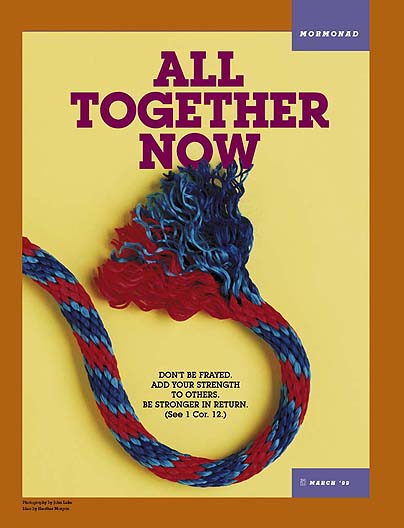Sometimes, teenagers who have been taught that God expects us to live by high standards and to condemn sins wonder how they should react to people who live in different ways. What about tolerance?
Mormon leaders have talked about this a lot. Mormon is an informal nickname some people use when they’re talking about members of The Church of Jesus Christ of Latter-day Saints. Most Mormons actually call themselves LDS (Latter-day Saints), not Mormons, although the Church has accepted that Mormon is more popular among people who aren’t Mormon. It refers to the Book of Mormon, which Mormons use along with the Bible.
One Mormon leader, Russell M. Nelson, explains that there is a difference between tolerance and tolerating. Knowing that difference can help us figure out how to live in a very diverse world. He suggests we look at Jesus’ life to help us understand how we should react to people who live lives we know are immoral.
When I read the New Testament, one of the things I notice is that Jesus didn’t just hang out with other Christians. He had a lot of friends and he spent a lot of time with people who didn’t live the commandments or who were considered inferior by others. I notice that he treated these people with respect.
For instance, most people in his time wanted nothing to do with Samarians. But Jesus intentionally traveled through Samaria and stopped to share the gospel with a Samarian woman at a well. He treated her with dignity and she responded by becoming a missionary for the gospel.
You might remember the story about the woman everyone wanted to stone because she had sinned. They brought her to Jesus, hoping, no doubt, He would be shocked and horrified by her sin and maybe even help with—or at least approve—the stoning. What did He do instead? He suggested that the person in the group who had never sinned throw the first stone. Of course, He was the only person who fit that description, but He had no desire to stone her. Once the others, embarrassed, had left, Jesus spoke to her kindly, telling her He was not going to pass final judgment on her.
Even though He sent her on her way, it is really important to notice what else He did. He told her not to sin anymore. He didn’t say, “It’s her life. I need to be tolerant of how she chooses to live it.” What she had done was a sin and He made sure she understood that. However, He wasn’t willing to kill her over it or decide how she would be judged at the end of her life. By telling he she had sinned, but sending her away with a commandment to stop, He gave her a chance to repent, to change her life before she died and faced final judgment.
Jesus never did just accept sin because it was the politically correct thing to do. When He saw sin, He put a stop to it. He cleared the temple. He spoke up even to political leaders and powerful community people. He did not tolerate sin. But He was tolerant, in that He treated people who sinned with dignity. He could love them as people without accepting their sins. He didn’t say “You have a right to live any way you want, even if it hurts you and even if it hurts others.”
There is a difference between the sin and the sinner. You’ve probably heard people say we must condemn the sin, but love the sinner. This is what Jesus did.
Some sins hurt other people and some only hurt the sinner directly (although all of society suffers when sin is in the world) but we know we can’t just let people do whatever they want to do because it’s “their life.” The reason we have laws is because we understand our country works better when we set standards and make people live by them. The reason parents have rules is because it is their job to set standards and to protect their children.
When you were little, your parents didn’t let you cross the street alone because they knew it would put you into physical danger. Today, they might have rules about coming home at a certain time or even about what kinds of friends you can have. They aren’t trying to ruin your fun. They are trying to keep you safe. Sometimes they are keeping you physically safe, but other times, they are keeping you morally safe. God is that kind of parent.
The thing is that this life is only a small part of your entire life. The longest parts of your life happened before you were born, when you lived with God and started becoming who you are now, and the time after you die. After you die, you’ll live forever, and how you live depends a lot on the choices you make today. Jesus taught over and over that there will be a judgment day when the sins we don’t’ repent of will be punished. He said that only people who kept His commandments would get to be with God after death. Your parents are trying their best to help you live in a way that will allow you to live with God someday. That means they sometimes make rules that are protecting your eternal life.
So how do you apply all this when you’re out in the world surrounded by people who are living lives you know are wrong? Let’s look at a few examples and wonder how Jesus would handle it.
One thing Mormons do is to make it clear that temptations and behavior aren’t the same thing. We can’t choose what we are tempted by or inclined towards. We can choose how we act. An alcoholic who is still drinking is committing a sin. If he stops drinking, but still craves alcohol, he is not sinning—as long as he doesn’t take a drink. He can control the actions, not the cravings. Homosexual tendencies are not a sin; homosexual behavior is. We can be kind and respectful when we are with people who are homosexuals because they are God’s children and therefore deserving of respect. We don’t have to respect their sins, however, nor do we have to encourage them. Jesus didn’t and so we shouldn’t. We may have friends who smoke and we will love them and treat them kindly, but we don’t have to let them smoke around us. We can love our friends who drink, but we don’t have to—and must not—serve alcohol at our parties just to “prove” we are tolerant.
If you had friends who were doing things you knew was very dangerous—dating an abusive boyfriend, for instance, or drinking, or going into dangerous neighborhoods–you would try your best to stop them. Spiritual danger is more serious than physical danger. You can show love to a person and treat him or her with respect while not respecting those dangerous choices.
At school and in your daily activities, you will meet a lot of people who live in ways you know are wrong. You don’t have to stay at a party where teens are drinking just to show you are tolerant. You don’t even have to tell them they are welcome to live that way. You do have to treat them kindly, help them when they are in trouble, and be respectful of them as people—but you don’t have to respect their sins.
Next time, we’re going to talk about tolerance in terms of religion—how do we live in a religiously diverse world?


